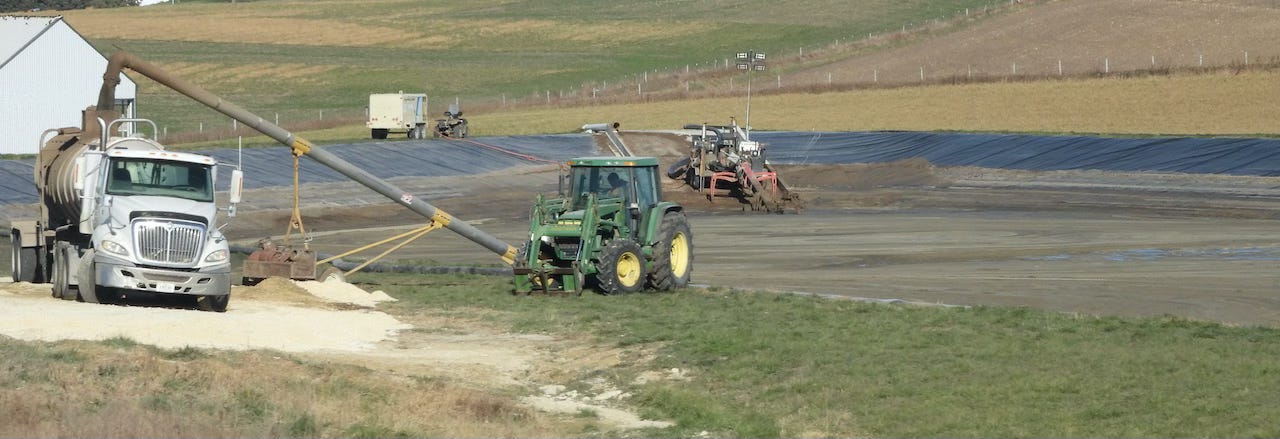It’s the WRONG place for a 10,000+ head cattle feedlot!
In the headwaters of a premier trout stream, a state-designated Outstanding Iowa Water? No way!
C’mon, bureaucrats and industrial agriculture advocates! That should be a no-brainer, as countless thoughtful Iowans (not just us trout-huggers and curmudgeons!) have pointed out for almost eight years. We’ve been raising questions about Walz Energy, which later became Supreme Beef LLC, ever since construction began on the mega-livestock facility in the watershed of Bloody Run Creek, near Monona, in 2017.
Finally, after almost eight years of our appeals falling on seemingly deaf ears, a judge has told the Iowa Department of Natural Resources (DNR) that the agency should have listened.
In a proposed ruling issued Nov. 12, administrative law judge Toby Gordon agreed with our contention that the DNR is required by law to consider protection of natural resources when issuing permits to use those resources. What a novel concept!
Seven of us had challenged the DNR’s renewal of a water allocation permit the agency issued to the cattle operation in 2017, then renewed in 2022. Through our attorney, James Larew, we highlighted incongruities and inconsistencies in the process and the permit. Cattle likely drink more water than the permit allowed. Disposing of manure from those cattle poses a real threat to streams and groundwater in Clayton County’s karst topography. Had the DNR really considered the environmental effects of the water withdrawal, other than to call it a “beneficial use” for the permit holder?
Judge Gordon mostly concurred. Just because the water may be “beneficial” for the permit applicant, “it does not alleviate the DNR from asking the question of whether it is a beneficial use, and thereafter supporting its decision with a reasonable and rational articulated basis for determining the intended use to be a beneficial use as required by the statute.”
Gordon ordered the agency to review the permit, and, as Iowa Code requires, to “articulate a reasonable and rational basis” to determine:
· effects on other landowners;
· “best interests and welfare of the people;”
· impacts on long-term availability of water;
· “that the best interests and welfare of the people are served;”
· “the public’s health, safety, interests in lands or waters, and prevention of injury to persons or property.”
Despite a several hiccups and delays, Supreme Beef has been operating since 2022 although with slightly fewer cattle than the 11,600 animals allowed by a DNR-approved “nutrient management plan” (NMP). The DNR fined Walz Energy for environmental violations during construction. There were lawsuits and counter-lawsuits between the initial partners, then more lawsuits between the feedlot operators and their engineers. Supreme Beef was required to revise its NMP after a Sierra Club lawsuit successfully challenged its validity. More recently, a contractor hired to spread manure from the facility’s 30-million-gallon lagoon was cited by the DNR for not properly handling the livestock sewage.
Judge Gordon’s ruling is merely a proposal, however, subject to the discretion of DNR director Kayla Lyon, who can reject or modify his decision. But, at the very least, his findings have highlighted the state agency’s apparent willingness to defer to industrial agriculture when considering regulations for animal feeding operations. Of course, industrial agriculture also seems to have a stranglehold on the Iowa Legislature, whose members could – if they chose – enact tighter rules to protect Iowa’s water and land resources.
Attorney James Larew noted that judge Gordon’s decision potentially could apply to all water allocation permits – not just the case of Supreme Beef. Ethanol plants, computer centers, and the proposed CO2 pipeline come to mind.
Larew said the administrative law judge’s ruling, if put into effect, could create a “seismic shift” in how the DNR processes applications for a required permit for anyone who proposes to use more than 25,000 gallons of water per day.
“If this decision goes forward,” Larew declared, “it represents a significant advance in Iowa’s clean water advocacy.”
Personal note:
Am I hypocritical? I plead not guilty.
OK, I grew up on a farm where our cattle sometimes drank from, walked across, or pooped in the creek. I realize that times - and the scale of animal agriculture - have changed in seven decades.
I still occasionally eat beef. But surely we can find ways to raise livestock in a way that’s compatible with a cleaner environment.
I’m a privileged to be a member of the Iowa Writer’s Collaborative. Please check the work of other IWC members listed below. Most posts are free, but we appreciate paid subscribers who are able to support our work.
Paid subscribers also receive perks - such as an invitation to a monthly chat with IWC members. AND, if you subscribe soon, you’re eligible to attend an IWC holiday party on Friday, Dec. 13, from 5-8 p.m., at the Harkin Institute at Drake University in Des Moines. Again, for paid subscribers only. RSVP here.
https://forms.gle/cGSXk6eUQMdP7daDA
IOWA WRITERS COLLABORATIVE






Thank you Larry for this strong writing, and for your continued work--along with Chris Jones, Steve Veysey, Jim Larew and others -- to protect Bloody Run and other water resources. In Iowa, outrageously irresponsible deregulation by our legislature is an open invitation to the Big Ag cartel, CAFO and methane producers to recklessly use and abuse our air, soil, water and human health.
Congratulations! Huge step forward, Larry. I did not know you were doing this, but I applaud your efforts. And, no, you are not a hypocrite. You're a warrior. Thanks.